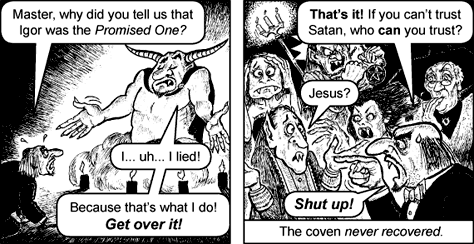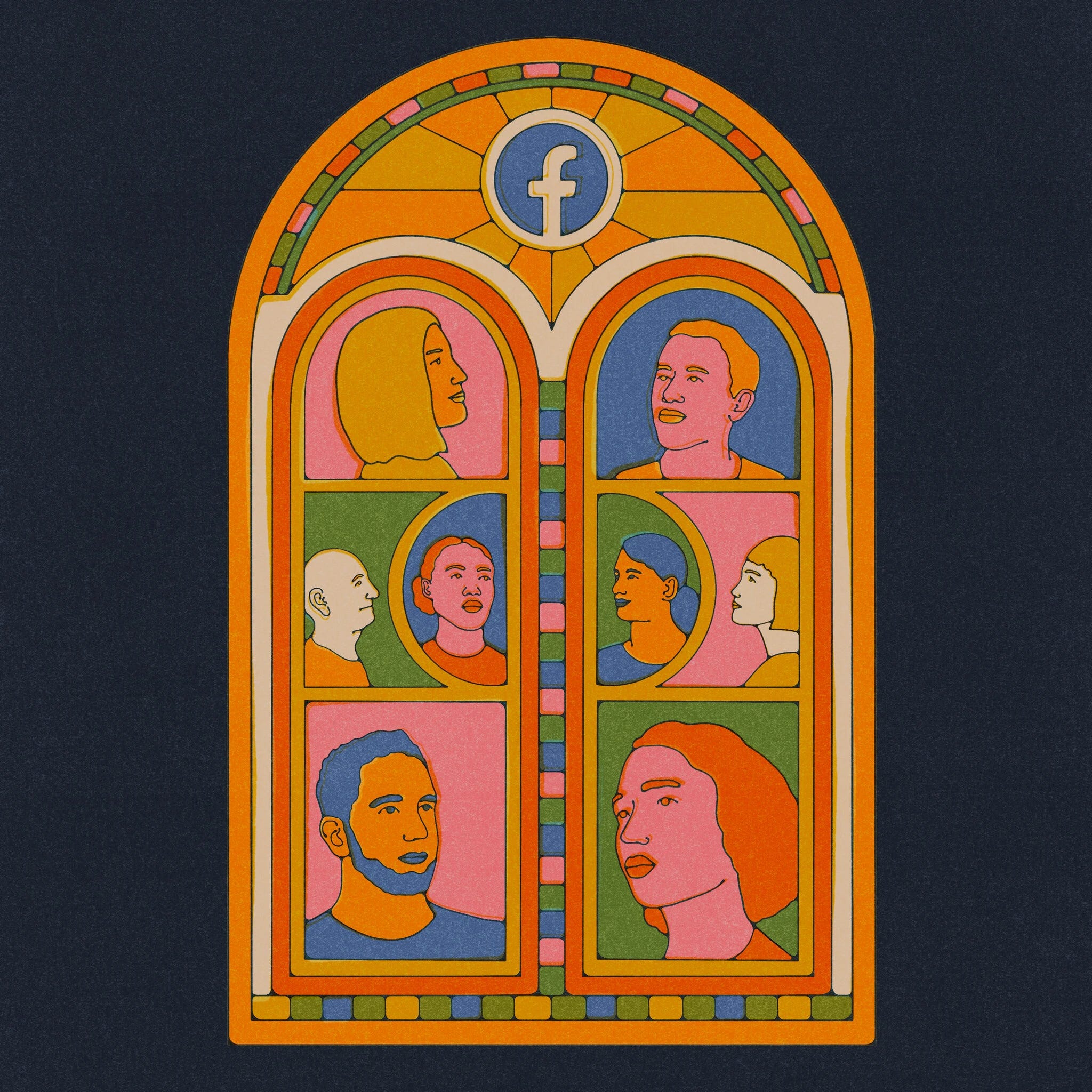The deconstruction industry
Also, Facebook has found religion
Hello and welcome to Modern Relics, the newsletter where I take a look at religion, pop culture and the internet.
Please subscribe - it’s free, and you’ll get every post I publish delivered right to your inbox.

First, a note on the name
The eagle-eyed among you will have noticed this newsletter has a brand new name! When I began this newsletter I didn’t know what to call it, but I knew I didn’t want a name to stand in the way of actually doing the writing I wanted to do. So, I picked something that was good enough and began typing. But I found “Throwaway Relics” difficult to type and to say out loud, and it just wasn’t as snappy as I wanted.
“Relics” worked for me (I find myself using it as shorthand for the whole project), so I feel like “Modern Relics” is cleaner and still retains the incongruence I was going for with the original title. Anyway, happy 10th edition! I didn’t intend to do this weekly when I started, but that is in fact what I have done so far. So… that’s good! Onwards!
Let’s take a look at deconstruction
I mentioned in my CCM edition that there’s probably a whole post to be written about the people who were once big in the Christian music industry but went on to deconstruct their faith and follow a radically different path - inside or outside the faith.
Certain names spring to mind: Derek Webb, Kevin Max, Audrey Assad, Jon Steingard, etc. It’s not limited to Christian musicians, but they’re an interesting group considering how all-encompassing the Contemporary Christian Music industry is.
Derek Webb works at a church now
This week, a couple of things happened that convinced me now is the time to dive in to this topic. First, Derek Webb announced his new role at GracePointe Church in Nashville, I think working on their on-stage production and music ministry.
Why is this interesting? Derek describes himself as a ‘hopeful agnostic’.
Derek is a former musician in Caedmon’s Call and went on to have a solo career, which was controversial because he would swear (by CCM standards) in some of his songs. His 2005 album Mockingbird is still one of the best critiques of the American Religious Right out there - it was very important in my own faith journey, and it still holds up over 15 years later.
His post-CCM career has consisted of making music about searching for truth, and he’s not done exploring matters of faith - in the video announcing his new album he asks, “What if ‘The Jesus Hypothesis’ is worth one more test?”
The Gungor tweet
The other thing that caught my eye: Michael Gungor became the main character of Christian Twitter for the day by posting the following tweet.
Of course, this tweet is highly unorthodox (Gungor is an atheist) but it’s frankly offensive to the other religious traditions he invokes. It’s clearly meant to be profound, but it’s just… careless and confusing? Anyway it got dunked on pretty hard.
The movement of deconstructing faith is significant enough to be covered by outlets as diverse as RELEVANT and The Gospel Coalition. Personally, I find a lot of the work done by people going through public deconstruction very helpful (Rachel Held Evans’ books come to mind).
But there’s a tension inherent in this kind of work. It has become something of an industry - and at risk of inheriting all the flaws from the Christian marketplace from which it sprang.
Many CCM folks, like Gungor, must constantly refer back to their careers as Christian artists, despite having almost entirely rejected the basis for that previous work. I’m sure there’s a temptation to build a personal brand of takes that are more inclusive and more cutting-edge than before, until you get something like Gungor’s tweet above.
It runs the risk of being the Waluigi of faith - a step removed from and set up in opposition to the original, but bewildering and nonsensical on its own. Without a lot of work and care, it becomes a parasitic relationship.
This meme has sent me into outer space
1 Like = 1 Prayer
It looks like Facebook is making a concerted effort to integrate religious communities into its ecosystem. As Ryan Broderick from Garbage Day writes, Facebook is trying to pull all aspects of our lives into what Mark Zuckerberg calls a “metaverse”.

First I heard about this was Reuters’ report on Facebook launching a prayer tool for all US users. A few days later, the New York Times reported that Hillsong Atlanta partnered with the tech giant for the launch of their new congregation (or ‘campus’ as they say in the denomination).
The prayer tool is extremely weird to me, but I guess it’s not surprising given that people were using the platform as a spiritual tool anyway (I frequently see prayer requests in my feed - I don’t know about you).
The tool itself seems pretty basic, and makes me think of clicktivism but for God.
From the Reuters report:
In one private Group seen by Reuters, a woman used the tool to request prayers for an aunt sick with coronavirus. People replied by clicking a button to say "I prayed," and their names were counted underneath. Users could choose to be notified with a reminder to pray again tomorrow.
And of course:
A spokesperson said the data could feed into how Facebook's machine learning systems decide which ads to show users.
I think more significant is Facebook becoming a fundraising platform (which encroaches on pre-existing services like tithe.ly) and its new role live streaming religious services. It’s certainly true that religious groups are increasingly relying on the pay-nothing-upfront infrastructure Facebook provides, particularly during the COVID lockdowns.
It makes sense that a company focussed on social networks would try and integrate pre-existing communities with a lot of social capital - I’m kind of surprised the company hasn’t tried to do this earlier. The only problem will be if (and when) religious groups want to extract themselves from Facebook’s ecosystem, how easy it will be to leave.
It’s certainly a problem I face as an individual. I’d like to go, but my social life, my work and now my church is integrated into the platform, so I don’t have much choice but to stay.
A fun fact!
Other articles
Since starting Relics, I’ve started exploring other newsletters from around the place and I thought I’d shout out a couple that have been particularly interesting to me.
AMAZING Life Advice
My good friend Pat Norman has declared himself a guru, and his excellent newsletter is full of handy tips for living better. He writes…
You may be asking yourself what exactly qualifies me, Pat Norman, to dish out these spicy tips on how to live your best life. And that’s probably as good an opportunity as any to offer you my first piece of advice:
Stop doubting the advice that Pat Norman gives you. Just trust it blindly.
He gave me a shoutout too, which is nice.
Sydney at the end of the world
If you’re interested in religion, you’re probably interested in the end of the world. James Hennesey at The Terminal wrote an excellent post about Sydney’s prominence as a post-apocalyptic backdrop which spoke to me, given… everything…
Sydney, with its history as a far-flung port city on a mysterious continent, has been the focus of apocalyptic visions long before the marketing team for The Day After Tomorrow put a submerged Opera House on its posters. And Australia itself has also played that role in the global imagination.
Mary, mother of Jesus, returns as an icon for pop stars and social justice warriors
Finally, it’s not a newsletter but this piece from RNS about how Mary is regaining popularity thanks to Instagram and social justice movements like Black Lives Matter.
“This imagery captures the legacy of grief that comes from injustice,” said Adkins-Jones. “Perhaps Mary is a ready figure to call to memory because Jesus is a person who dies unjustly at the hands of the state. … Questions of justice are always in conversation with artistic representations.”
If you’ve been enjoying this newsletter, please share it.
If you have a tip or a post I should see, especially about a religion you don’t hear about all that often, please email me: rohansalmond@gmail.com. Also, follow me on Twitter: @RJSalmond.
Subscribe if you haven’t already :)

